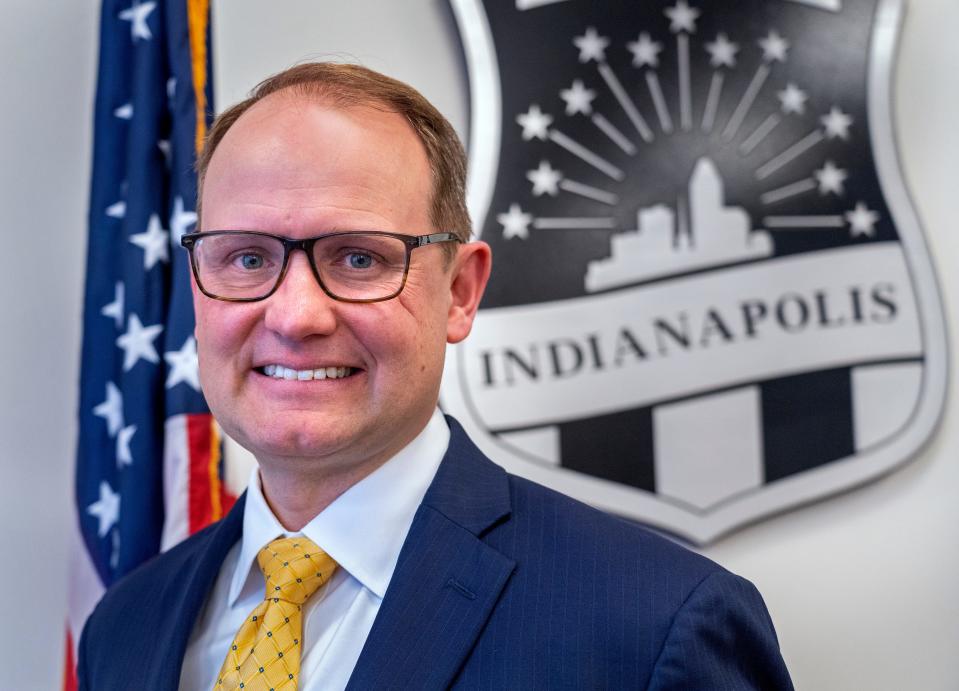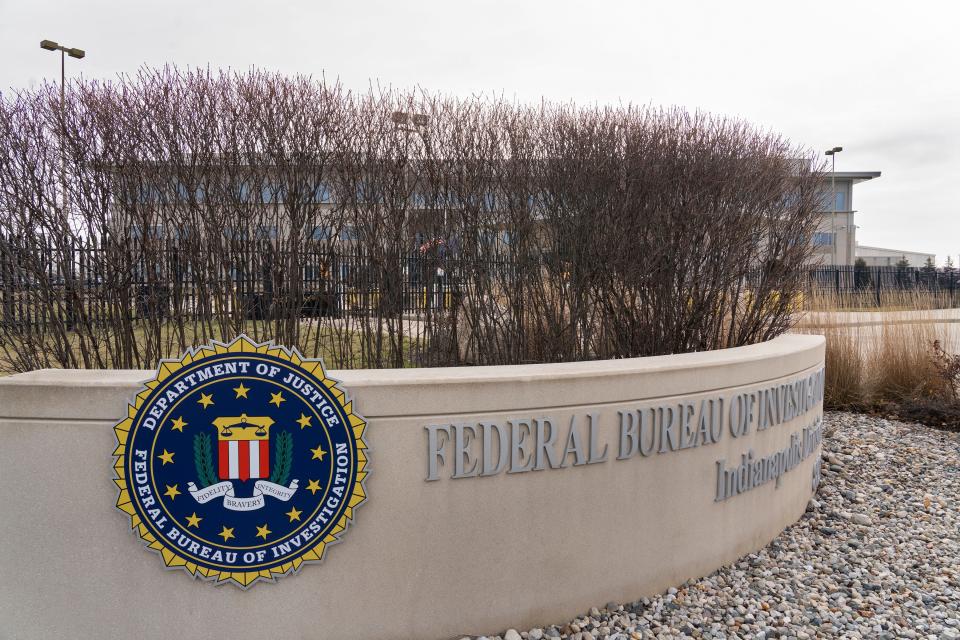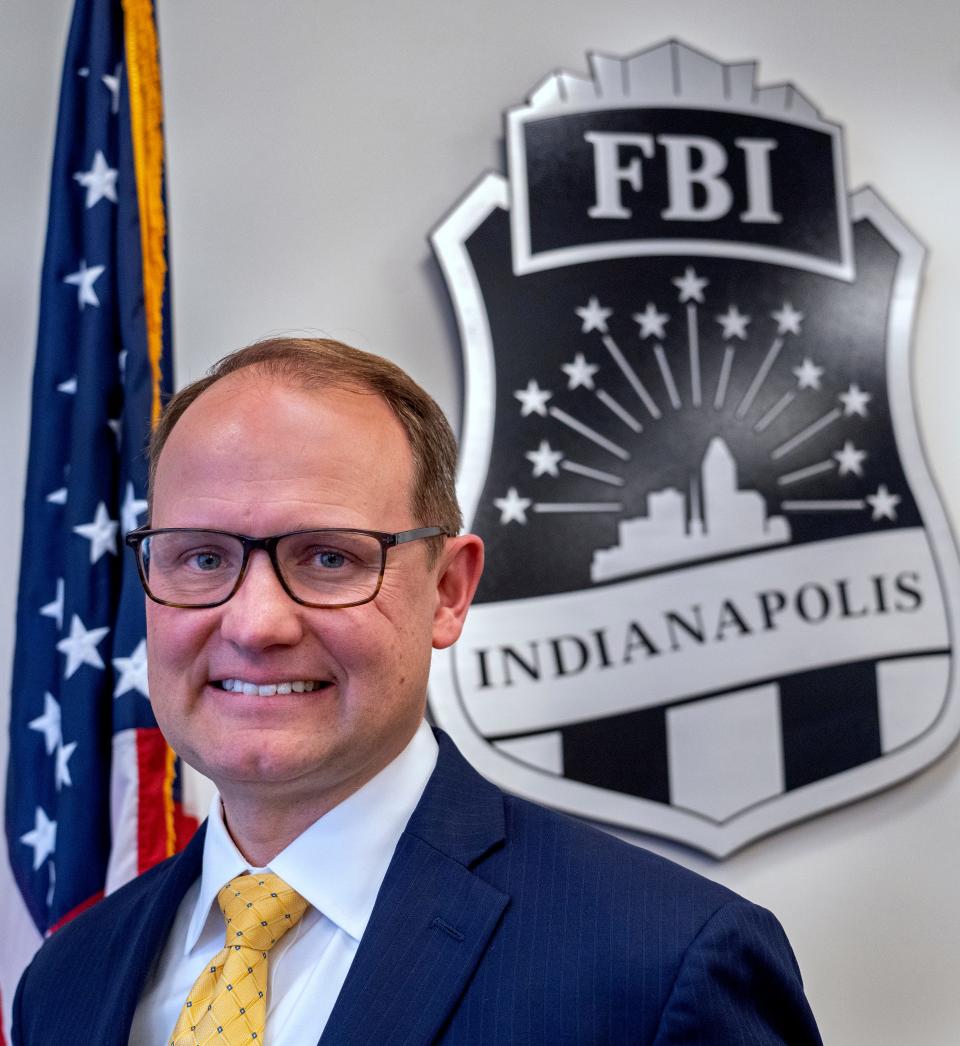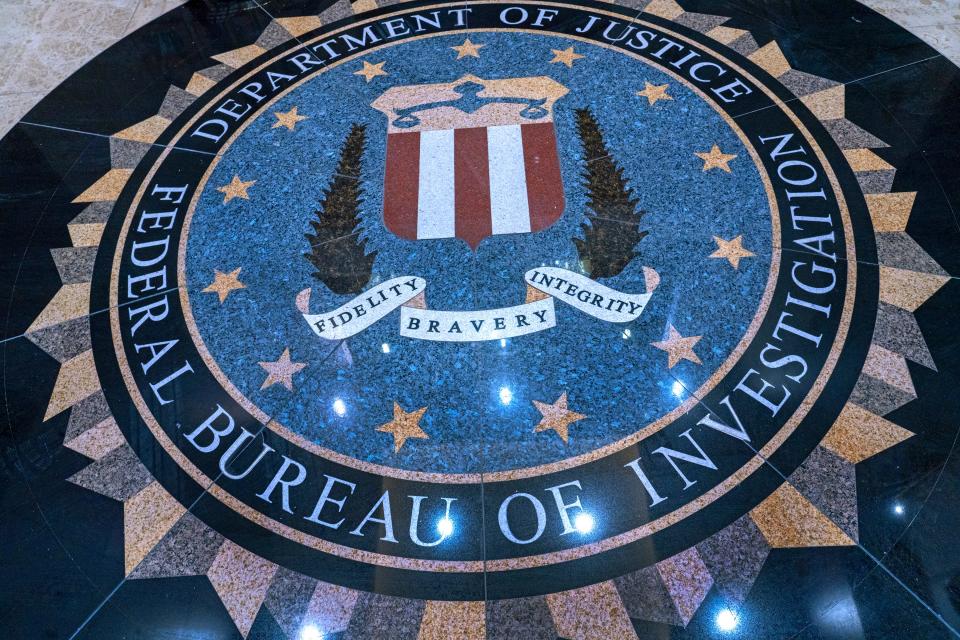'Sweetheart swindles': Romance scams rake in up to $1B per year
Editor's note: This story was originally published in 2023.
The man met Elizabeth Stevens on OurTime, an online dating site for people over 50. She lived overseas. He was in Pennsylvania.
They emailed and exchanged texts.
Soon, they were in love.
And then, she began asking for help with expenses, including money so she could come visit him in the U.S.
The smitten man dug deep to help his new love. Again and again. Sometimes, he sent money through wire transfers. Other times, he mailed envelopes stuffed with cash. He didn't find it unusual that the payments always went through people in Indianapolis. She told him they were her personal bankers in the U.S.
Within a year, he'd sent about $400,000 ― draining his entire 401(k) account.
But this love story doesn't have a happy ending. In fact, the elderly man's desire for companionship and love turned into a nightmare.
Elizabeth Stevens was not a real person. And the personal bankers? They were players in an elaborate romance scam that bilked the man out of his life savings.
Valentine's Day warning: Online 'crush' could be crook
The lovelorn Pennsylvania man, identified in federal court records only as E.M., is among a growing number of Americans targeted for romance scams, also known as sweetheart swindles. The toll reached a record high in 2021, when victims reported losing nearly $550 million, according to the Federal Trade Commission. Figures reported that year to the FBI were even more staggering ― about $1 billion in losses.
"Unfortunately, it's really profitable, and it's really common," said Herbert J. Stapleton, special agent in charge at the FBI office in Indianapolis.

The losses and number of victims have risen steadily in the last five years. While a majority of romance scams were perpetrated by criminal organizations in West Africa, mainly Nigeria and Ghana, they often have accomplices in the U.S.
In the case of E.M., two Indianapolis residents were convicted for their roles as money mules, people who facilitate financial transactions locally on behalf of scammers overseas.
Others with Indiana ties have been prosecuted in recent years. Hoosiers have become victims, too, some losing everything.
In Speedway, a man posing as an Army soldier proposed marriage to a woman he met on Mate1.com. Prosecutors said he convinced the woman, identified in court records as Victim 1, to take out a home equity loan and wire him $73,000.
A woman in Anderson fleeced a 96-year-old man, identified as C.K., after they met on Plenty of Fish, prosecutors alleged. The elderly widower from Rhode Island lost $80,000.
And in New Palestine, a man sent more than $1.2 million to a Texas woman he met on Twitter. The woman, prosecutors alleged, begged for help with medical expenses. Instead, she is accused of gambling away much of the money.
Older people are the most common targets.
"Sometimes, we will see certain senior citizens, not all, who are less Internet savvy … (and) less familiar with the types of frauds that are maybe out there," Stapleton said. "And sometimes, it could just be because a particular person is, you know, really looking for a relationship actively. It could just be the result of loneliness."
$200,000 lost Indianapolis man accused of laundering money from romance scam
How do romance scams work?
Scammers target people looking for relationships — widows or widowers, divorcees and lonely singles. They endear themselves by pretending to share common interests, Stapleton said. They use fake profiles, usually with attractive photos they swiped from the Internet.
Within weeks or months, they're proclaiming their love, even proposing marriage. And yet, they always find reasons ― they're working overseas or serving in the military or stuck on an offshore oil rig ― to avoid meeting in person.
And then, suddenly and often desperately, they need money.
Romance scams: How to avoid becoming the victim of an online 'Sweetheart Swindle'
Sometimes, they cite some kind of financial problem, like a crippling debt or a personal crisis. Maybe it's a sick family member or help with a "can't miss" business deal. Or they need to pay taxes to collect an inheritance. The pleas typically center on a promise of repayment, often from funds the scammer says they are temporarily unable to access.
E.M.'s case bears many of these characteristics.
He met the scammer posing as Elizabeth Stevens in 2018. The woman soon began asking for money to pay for unexpected expenses. Later that year, E.M. wired $50,000 to a Fifth Third Bank account opened by a woman in Indiana named Angeles Palacios, whom he believed was his ladyfriend's personal banker, according to charging documents filed against Palacios in 2019.
Palacios, according to court records, had accounts at several Indianapolis-area banks. She told investigators she opened the accounts, withdrew money whenever she was told — thousands of dollars at a time — and gave the cash to a man described in court records as her "handler." She said he'd threatened her life if she didn't follow orders.

E.M.'s scammer later directed him to stop wiring money to Palacios and start mailing cash to another purported personal banker, a man using the name Kareem Sunday.
Investigators later found that Sunday had been receiving packages since late 2018 from multiple out-of-state locations, according to court records. Sunday, who's real name is Edwin Agbi, also was living in Marion County. He told investigators the money were sent to him by "clients," and he'd received more than $75,000 over the past year. Court records said he kept some of the money and the rest ended up in Nigerian bank accounts.
Both Palacios and Agbi have been convicted. Palacios pleaded guilty to wire fraud and was released last year. Agbi is serving a nearly five-year prison sentence after a jury convicted him in 2022 of mail fraud, money laundering and conspiracy charges involving E.M. and several other elderly victims.
In another case, the perpetrator was living in Marion County and had mules of his own.
Prosecutors said Ismaila Fafunmi, who also lived in Speedway, met the woman identified as Victim 1 in 2018. He introduced himself as Thompson Galbraith, an Army soldier from California. He said he was based in Syria. At some point after meeting on Mate1.com, Fafunmi proposed, according to court records, but claimed he needed $75,000 to get out of his Army contract and come home.
Victim 1, who's from Kentucky, ended up wiring Fafunmi $73,000 after taking an equity loan on her house. She wired another $2,500 to Fafunmi's money mule, believing it was for "wedding preparations," according to court records. Over the course of four months, she'd also sent him $200,000 worth of gift cards, Apple products and other electronics.
Fafunmi, who prosecutors said was part of a network of scammers who impersonated military men on dating websites, pleaded guilty in 2020 and is serving more than four years in prison.
Chocolates, a bar of soap and $20,000 in cash
Victims become so caught up in the scam it is not uncommon for them to miss or ignore obvious red flags, said Stapleton, the FBI official.
"We often will see an instance where maybe a family member may report the crime, but then when an investigator goes out to talk to the victim, the victim refuses to believe they've been taken advantage of," he said. "It could be that a person feels like they have such a connection with the person that they believe they're in love with, that they don't want to listen to anything their family or even the FBI says."

In early 2019, for example, investigators met with E.M. They told the Pennsylvania man he'd been the victim of a scam. The news came as he was getting ready to send a package to Agbi, the money mule he knew as Sunday. Inside were three boxes of Russel Stover chocolates, a paperback novel, a gift-wrapped bar of artisan soap — and $20,000 cash stuffed in an envelope.
Despite the warning, E.M. still sent the package. Investigators tracked it to Agbi's home in Speedway.
In Victim 1's case, she also allowed the scammer posing as Tom the soldier access to her bank account, believing he was paying off credit card bills for her. But court records said Fafunmi instead left the victim buried under a massive amount of debt she's unable to pay.
It wasn't until Fafunmi asked her to take a second loan on her house that the woman became suspicious and reported the scam to the FBI.
In other cases, Stapleton said, targets become aware they've been victimized, but are too embarrassed to admit they've been duped.
"Which is certainly something that we don't want people to feel because this is extremely common," he said. "You want people to come forward and understand that they're not alone."
The rise of social media and crypto
Years ago, online scams were restricted to emails, usually from some downtrodden prince trapped in some far-flung country. In messages often littered with typos and misspellings, the writer would explain they had a fortune but couldn't access, or needed to move their money to the U.S. because of political upheaval or some other reason. And you — a random person they fund on the Internet — were the one who could help by forking over your bank account information.
But online scams have become much more sophisticated, pervasive and predatory with the advent of social media and dating websites. Fraudsters monitor posts and dating profiles to understand their victims' personalities, hobbies and interests. Then they personalize their approach to someone who appears to be a likely target, Stapleton said.
"You have to look at it a little bit through the eyes of the victims," he said. "They're already predisposed to be looking for someone who shares their interests. And so when someone says they like the same books, or love the beach, or they love to travel, they love to hike, it's sort of a dream come true for these victims."
A more recent trend involves luring victims into investing in some type of cryptocurrency, Stapleton said.
'Unlike anything we've ever seen': Black artists use NFTs to cash in on $40-billion market
Scammers pretend to be experts and slowly convince their victims to invest, promising large returns and referring them to a fake website or app they control. After squeezing victims for every dollar they can get, the scammers disappear — along with the money.
It's called pig butchering. The FBI's Internet Crime Report in 2021 describes it as a process in which "victims’ investment accounts are fattened up before draining, much a like a pig before slaughter."
Limitations to law enforcement
The sheer volume of incidents — hundreds of thousands of victims every year — make them difficult to prosecute, Stapleton said. The international scope also means lengthier and costlier investigations that require cooperation from law enforcement agencies in other countries.
And when investigators have nothing to go on other than a fake name and an IP address, they need to rely on third parties to trace names and locations. "We might not always be able to get that information if it's overseas," Stapleton said.
In 2019, the Justice Department announced the arrest of nearly 300 alleged fraudsters from several countries tied to romance scams and other types of swindles. More than half of those arrested were in Nigeria, and 74 were in the U.S.
That was the last time an international, coordinated effort to crack down on scams was conducted, Stapleton said. The pandemic slowed down such investigations, which also are lower on the priority list than violent crimes and national security issues.

Not all perpetrators are foreigners.
Late last year, Hancock County prosecutors charged a Texas woman for allegedly defrauding the New Palestine man she met on Twitter. Over the course of a year and a half, the man gave Lorraine Rew $1.2 million from his retirement and bank accounts and through personal loans, according to court records.
Prosecutors alleged Rew claimed to need money to prepay for health care expenses and cover medications, which she said insurance would reimburse.
In one message, according to court documents, Rew played the sympathy card as she pleaded for $20,000.
"It's a heart medicine. The one I'm permanently on," she texted the man. "Once it runs out, I'll have way too many issues. Nothing for you to worry about. Since there's nothing you can do."
Another was even more dire. If she didn't get her medicine, Rew texted, "I won't be around."
"Ugh honey," the man replied, "I'm trying honey."
He encouraged her to remain positive, but she responded: "I have to think this way. I know what's going to happen when I don't take the meds."
The next day, he texted Rew with good news.
"I think I have the 20k honey," he wrote.
"Think?" Rew snapped back.
Instead of medicine and medical bills, prosecutors alleged, Rew spent the money at casinos.

Rew, who's facing nearly a dozen charges, is being held on a $25,000 bond at Hancock County Jail in Greenfield. Her trial is scheduled for May 16. There is no defense attorney listed yet on her online court docket.
Stapleton said one of the most effective ways to curb scams is to approach online relationships with a healthy dose of skepticism.
He said the FBI wants to dedicate time and resources to investigating romance scams, but added: "We just can't simply work all the cases."
Contact IndyStar reporter Kristine Phillips at kphillips@indystar.com. Follow her on Twitter: @bykristinep.
This article originally appeared on Indianapolis Star: Romance scam steal hearts and money from victims seeking companionship

